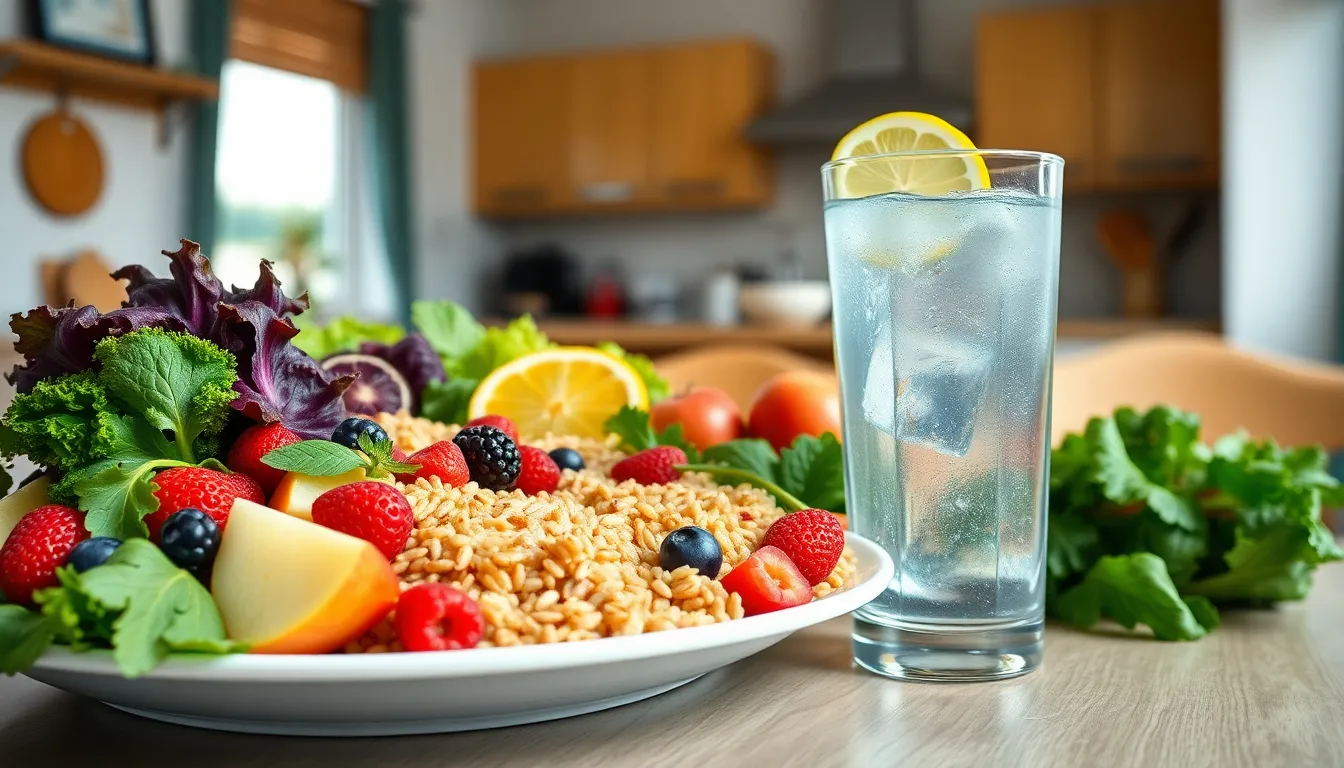Table of Contents
ToggleStruggling with constipation can be frustrating and uncomfortable. Many people find themselves asking, “What will help me poop?” The good news is that simple lifestyle changes and dietary adjustments can often provide relief. Understanding the factors that contribute to healthy bowel movements is key to tackling this common issue.
From fiber-rich foods to hydration and physical activity, several effective strategies can promote regularity. By incorporating these elements into daily routines, individuals can support their digestive health and alleviate discomfort. This article will explore practical tips and natural remedies to help get things moving smoothly again.
Understanding Constipation
Constipation is a prevalent digestive issue that affects many individuals. Recognizing its causes and symptoms plays a key role in managing and alleviating the discomfort.
Common Causes
- Dietary factors: Low fiber intake, dehydration, and excessive consumption of processed foods can slow digestion.
- Sedentary lifestyle: Lack of physical activity can reduce bowel motility, contributing to constipation.
- Medications: Certain medications, particularly pain relievers and antacids containing aluminum or calcium, can result in constipation.
- Medical conditions: Disorders like hypothyroidism, diabetes, and irritable bowel syndrome (IBS) may interfere with bowel function.
- Stress and anxiety: Psychological factors can disrupt normal gastrointestinal activity, leading to constipation.
Symptoms to Watch For
- Infrequent bowel movements: Fewer than three bowel movements per week often indicates constipation.
- Hard or lumpy stools: Difficulty in passing stools can signify inadequate fiber or fluid intake.
- Straining during bowel movements: Excessive effort to have a bowel movement may suggest underlying constipation.
- Abdominal discomfort: Bloating, cramping, or pain in the abdomen can accompany constipation.
- Incomplete evacuation: A sensation that bowel movements are not fully complete may occur.
Dietary Changes for Better Digestion

Dietary changes play a vital role in improving digestion and promoting regular bowel movements. Certain foods and nutrients significantly impact digestive health.
Foods That Promote Regularity
Incorporating specific foods into the diet aids in enhancing bowel regularity. Consider these options:
- Fruits: Apples, pears, and berries are high in fiber and promote healthy digestion.
- Vegetables: Leafy greens like spinach and kale, along with carrots and broccoli, supply essential nutrients and fiber.
- Whole Grains: Oats, quinoa, and brown rice provide complex carbohydrates and fiber necessary for bowel health.
- Legumes: Beans, lentils, and chickpeas are rich in fiber and can help maintain a healthy digestive system.
- Nuts and Seeds: Almonds, chia seeds, and flaxseeds add fiber and healthy fats that support digestive regularity.
The Role of Fiber
Fiber is essential for digestive health, as it adds bulk to stools and facilitates their passage through the intestines. Two types of fiber contribute to regularity:
- Soluble Fiber: Found in oats, apples, and beans, soluble fiber absorbs water and forms a gel-like substance. This slows digestion and can help manage stools.
- Insoluble Fiber: Present in whole grains, nuts, and vegetables, insoluble fiber adds bulk to stool and promotes faster movement through the digestive tract.
A diet rich in both soluble and insoluble fiber often leads to fewer instances of constipation and supports overall gut health. For optimal results, individuals should aim for a daily fiber intake of 25-30 grams.
Lifestyle Adjustments
Lifestyle adjustments play a crucial role in managing constipation. Simple changes can significantly enhance digestive health and promote regular bowel movements.
Importance of Hydration
Hydration significantly affects bowel regularity. Drinking sufficient water helps soften stools, making them easier to pass. Aim for at least 64 ounces (about 2 liters) of water daily, but individual needs may vary based on activity level and climate. Additionally, consuming hydrating foods like cucumbers, oranges, and strawberries contributes to fluid intake and aids digestion.
Exercising Regularly
Regular exercise promotes gastrointestinal motility. Engaging in physical activity, such as walking, jogging, or yoga, stimulates the muscles in the intestines, leading to improved bowel movements. The recommendation includes 150 minutes of moderate aerobic activity weekly, combined with strength training on two or more days. Even simple changes, like taking the stairs or stretching during breaks, can enhance digestive function.
Over-the-Counter Remedies
Over-the-counter remedies can effectively relieve constipation. These options vary in type and action, helping to facilitate bowel movements.
Laxatives and Their Types
Laxatives come in several types, each serving a unique purpose to ease constipation:
- Stimulant Laxatives: These stimulate intestinal muscles to promote movement. Common examples include bisacodyl and senna.
- Osmotic Laxatives: These draw water into the intestines, softening stool. Popular choices are polyethylene glycol (Miralax) and magnesium hydroxide (Milk of Magnesia).
- Bulk-forming Laxatives: These increase stool bulk by absorbing water. Psyllium husk and methylcellulose are widely known bulk-forming agents.
- Lubricant Laxatives: These coat the stool, making it easier to pass. Mineral oil serves as a common lubricant laxative.
Selecting a laxative depends on individual needs, tolerance, and underlying health conditions.
When to Consider Supplements
Supplements can provide additional support for bowel regularity, especially when dietary sources are insufficient.
- Fiber Supplements: These contain psyllium or inulin, enhancing daily fiber intake and promoting regularity. Recommended brands include Metamucil and Benefiber.
- Magnesium Citrate: This supplement attracts water into the intestines, facilitating easier stools. It’s often used for quick relief in more severe cases.
- Probiotics: These aid intestinal health by balancing gut bacteria. Probiotic strains like Bifidobacterium and Lactobacillus may help regulate bowel movements.
Individuals should consult healthcare professionals before introducing supplements, particularly if they have existing health concerns or take medications.
Natural Approaches
Natural approaches can effectively aid digestion and relieve constipation symptoms. Certain herbal remedies and relaxation techniques promote bowel regularity and overall digestive health.
Herbal Remedies
Herbal remedies offer natural alternatives for enhancing bowel movements. Common herbs known for their laxative properties include:
- Senna: Contains compounds that stimulate intestinal contractions, making it effective for short-term use.
- Peppermint: Relaxes the digestive tract muscles, helping ease discomfort and promote movement.
- Ginger: Aids in digestion and reduces bloating, increasing overall digestive efficiency.
- Psyllium: High in soluble fiber, it promotes bulk formation and easy stool passage.
- Dandelion: Acts as a mild laxative and supports liver health.
When using herbal remedies, it’s essential to follow dosage instructions carefully and consult a healthcare professional, especially for those with specific health conditions.
Relaxation Techniques
Relaxation techniques reduce stress and promote digestive health. Some effective methods include:
- Deep Breathing: Increases oxygen flow to the body, helping to relax tense muscles in the digestive tract.
- Yoga: Certain poses stimulate the digestive system and enhance movement, aiding regularity.
- Meditation: Reduces stress, which can negatively impact digestive function, fostering a more relaxed digestive environment.
- Warm Baths: Help relax muscles and alleviate abdominal discomfort, promoting better bowel movements.
Incorporating these relaxation techniques into daily routines can help maintain digestive health and alleviate constipation symptoms.
Finding relief from constipation involves a combination of dietary changes and lifestyle adjustments. By incorporating fiber-rich foods and staying hydrated individuals can support their digestive health effectively. Regular physical activity and relaxation techniques also play a crucial role in promoting bowel regularity.
For those seeking additional support over-the-counter remedies and natural approaches can provide further assistance. It’s important to tailor solutions to individual needs and consult healthcare professionals when necessary. With the right strategies in place anyone can improve their digestive health and alleviate discomfort.






